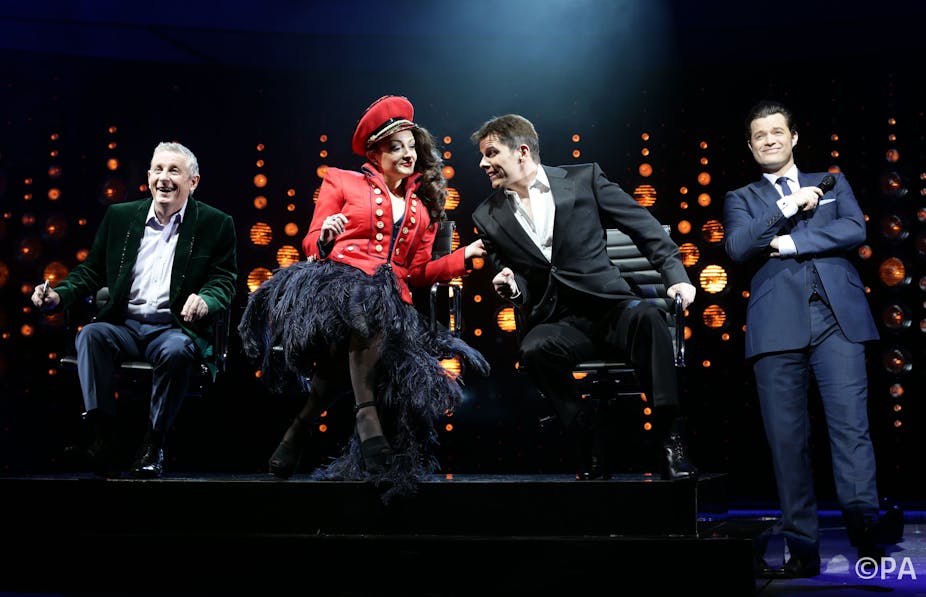You’re watching one of those films that I think of as “torture porn”, like Saw or The Collection, in which human captives have their bodies mutilated, dismembered or painfully abused. You’ve paid your admission, bought your popcorn and are enjoying the opening sequences of the Grand Guignol. Then, the first grotesquery approaches and you can barely watch; you clench your fists in preparation for the bloodshed … and you’re mortified by your reaction – but enjoy it all the same.
That’s how I – and I suspect many other millions of viewers – feel when watching The X Factor, a television show that has a resilient charm and which returns to ITV later this year for its eleventh series. The show features people with modest talents but abundant dreams, who are invulnerable to humiliation even when cruelly derided by a panel of judges. Aspiring singers become carrion.
We watch not as observers, but as agents who can cast judgement on the wannabe celebrities by texting in votes. The X Factor captivates us typically for five months of the year, concluding in December when the winner is elected. We start watching like insurgent anarchists and end up as citizens of a media democracy. Not that our elected victors always triumph. Often the discarded losers, like One Direction and Olly Murs become more successful than the actual winners.
The show is a ratings phenomenon: even in its declining years it attracts more viewers than Coronation Street. At the height of its popularity in 2010 it drew 17.5 million viewers (that’s nearly 28% of the UK population) to their screens. It also thrives on a kind of symbiotic relationship with red top tabloids, all of which carry gossipy stories, often scurrilous, on the contestants. And now it’s engendered a stage show.

I Can’t Sing! isn’t the first musical based on a TV show. Corrie was the subject of Street of Dreams. Jerry Springer Show, the template for so many shows, has also been the source of a musical, Jerry Springer: The Opera. Happy Days will also be a musical.
There have been countless stage versions of movies, of course; so television is presumably the next logical source of inspiration. All the same, The X Factor is a curious transposition: its plot notionally inspired by an unscripted talent contest that has plenty of humorous moments, but which is, if we dare utter this with a straight face, a talent competition.
There are uncertainties. For example, I Can’t Sing! will have an original soundtrack, which means audiences will not be familiar with the music and may not even like it. Unlike musicals based on familiar movies with a soundtrack, such as Priscilla, Queen of the Desert and Dirty Dancing, The X Factor TV programme has no original score, apart from its theme music. There has been one attempt to dramatise The X Factor-type shows. Peter Kay’s Britain’s Got the Pop Factor, in 2008, was a misfiring parody. It was one of those shows you almost wanted to laugh at. Then you realised it couldn’t exaggerate or caricature The X Factor: in fact, it was more restrained and thus less funny than the show it was meant to lampoon.
So why take the risk? As I Can’t Sing! is written by Harry Hill, we can safely presume it will not have the solemnity of, say, King Lear. Hill is a known commodity with a strong audience that’s receptive to his singular comedy. Then there is the original show’s formidable fan base. The X Factor has accrued a loyal following. If only a small fraction of the millions who have watched the show avidly over the years are curious enough to see the musical, then the show will be a commercial success.
Of course, those fans may also balk at not seeing the real Simon Cowell or Louis Walsh. Street of Dreams probably flopped because audiences were so inured to seeing the likes of Rita, Ken and Deidre on their TV screens five times a week that they couldn’t stand impersonators. In I Can’t Sing! actors will be doing their best impressions of Simon et al. They’ll be playing (irreverently, I assume) real figures, rather than dramatic artifices. And that could be crucial to the musical’s success.
It’s a gamble, but of the kind, say, Colgate-Palmolive take when launching a new dental product. The X Factor is a proven brand, so the musical will be an addition to an already-established range of products bearing its imprimatur. There is a commercial logic guiding this play. The same logic could deliver us other stage incarnations of TV shows that have proven track records.
A comedy drama like Benidorm seems a natural. Or even more serious shows such as Downton Abbey or Call the Midwife, both of which pull in eight or so million viewers in the UK alone. But please, please, please: not TOWIE. The programme’s paper-thin conceit surely couldn’t bear the weight of multilayering. Could it?

